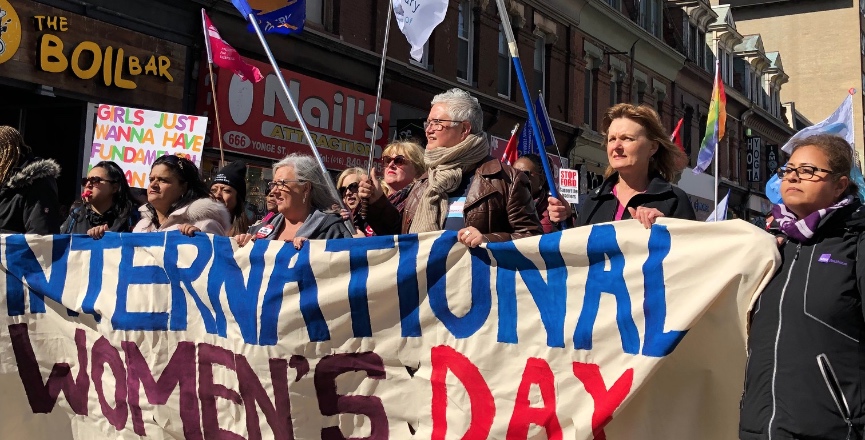Thousands of Torontonians took to the streets Sunday, March 8, to celebrate International Women’s Day and to urge resistance to the Ford government’s cuts in public education, health care, and social welfare in Ontario, which they say disproportionately affects women, children and society’s most vulnerable.
Chanting “This is what democracy looks like,” women of all ages, labour union members, teachers, Indigenous rights activists, migrant workers, refugees, midwives, nurses and families with children, marched from the Ontario Institute for Studies in Education (OISE) on Bloor Street, and wended their way towards Yonge and Dundas streets.
Toronto’s spring-like weather contributed to a light, nearly festive atmosphere, even as marcher’s colourful banners and placards raised serious issues — gender-based violence, gender pay gap, economic insecurity, missing and murdered Indigenous women, the climate crisis, among other things.
Some carried signs that read, “Support midwives: close the gender pay gap,” “Immigrant women need real jobs and living wages,” “No cuts to education,” and “Decent work and full immigration rights.”
Organized by Women Working with Immigrant Women and the International Women’s Day Organizing Committee, this year’s theme was, “the world is on fire — we are rising.”
Prior to the march, hundreds attended an indoor rally inside the OISE auditorium, which put a spotlight on what organizers described as “a war on women and children,” not just in Ontario but around the world.
“This is a day for celebration and resistance,” said Jenny Ahn, an organizing committee member.
“These are challenging times for women,” she said, citing corporate greed, climate change, violence against women, and the rise of rightwing populism around the world.
She mentioned the provincial government’s recent decision to cut $1 million in funding to Ontario’s 42 rape crisis centres as some examples of challenges facing women locally. “It’s 2020, this shouldn’t be happening,” she said.
At the same time, however, she said, “we have seen uplifting organizing by women, young women especially,” around the climate crisis. There has also been “an unprecedented level of courage and creativity” among activists calling for social justice in other parts of the world like Hong Kong, Chile, and Lebanon, she said. “The world is on fire, but we are rising. It’s a day to celebrate our collective voices and our power.”
Joy Lachica, president of the Elementary Teachers of Toronto, thanked parents and students for lending their support to the teachers’ rotating strikes. “Class size matters, safe and supported classrooms matter, special ed programming matters, preserving our kindergarten model matters and what is at stake is the very future of publicly funded education,” she said. “We will not see it dismantled on our watch. We will not back down.”
Liana Salvador-Watts, a parent of two, highlighted the “power of community organizing” as she told the story of how parents, retirees and other educators have set up “pay-what-you-can” childcare in low-income neighbourhoods as teachers strike.
Catherine Brooks, an Indigenous elder, opened the event with prayers and a smudging ceremony, saying it is everyone’s duty “to share and to care for one another with honesty and respect.”
This year’s march was noticeably different than previous years, largely due to the presence of more families with children, mothers pushing strollers with placards calling for universal childcare and an end to cuts in education and social welfare, and young women and girls calling for action on the climate crisis.
Marites N. Sison is a freelance journalist based in Toronto.
Image: Marites N. Sison



